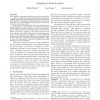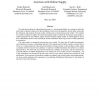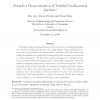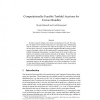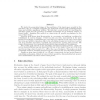138
click to vote
SIGECOM
2008
ACM
15 years 2 months ago
2008
ACM
We characterize truthful mechanisms in two multi-parameter domains. The first characterization shows that every mechanism for combinatorial auctions with two subadditive bidders t...
111
click to vote
SODA
2004
ACM
15 years 4 months ago
2004
ACM
We consider the problem of picking (buying) an inexpensive s-t path in a graph where edges are owned by independent (selfish) agents, and the cost of an edge is known to its owner...
126
click to vote
ESA
2008
Springer
15 years 4 months ago
2008
Springer
A truthful mechanism consists of an algorithm augmented with a suitable payment function which guarantees that the "players" cannot improve their utilities by "chea...
116
click to vote
SIGECOM
2010
ACM
15 years 7 months ago
2010
ACM
We study the problem of selling identical goods to n unit-demand bidders in a setting in which the total supply of goods is unknown to the mechanism. Items arrive dynamically, and...
134
click to vote
FOCS
2003
IEEE
15 years 8 months ago
2003
IEEE
This paper analyzes implementable social choice functions (in dominant strategies) over restricted domains of preferences, the leading example being combinatorial auctions. Our wo...
109
click to vote
APPROX
2004
Springer
15 years 8 months ago
2004
Springer
In many economic settings, convex figures on the plane are for sale. For example, one might want to sell advertising space on a newspaper page. Selfish agents must be motivated ...
116
click to vote
WINE
2007
Springer
15 years 9 months ago
2007
Springer
We study the frugality ratio of truthful mechanisms in path auctions, which measures the extent to which truthful mechanisms “overpay” compared to non-truthful mechanisms. In p...
114
click to vote
ISAAC
2007
Springer
15 years 9 months ago
2007
Springer
Most of the recent works on algorithmic mechanism design exploit the solution concept of dominant strategy equilibria. Such work designs a proper payment scheme so that selfish ag...
126
click to vote
WINE
2009
Springer
15 years 9 months ago
2009
Springer
We study the geometrical shape of the partitions of the input space created by the allocation rule of a truthful mechanism for multi-unit auctions with multidimensional types and ...
129
click to vote
APPROX
2009
Springer
15 years 9 months ago
2009
Springer
An important research thread in algorithmic game theory studies the design of efficient truthful mechanisms that approximate the optimal social welfare. A fundamental question is ...

